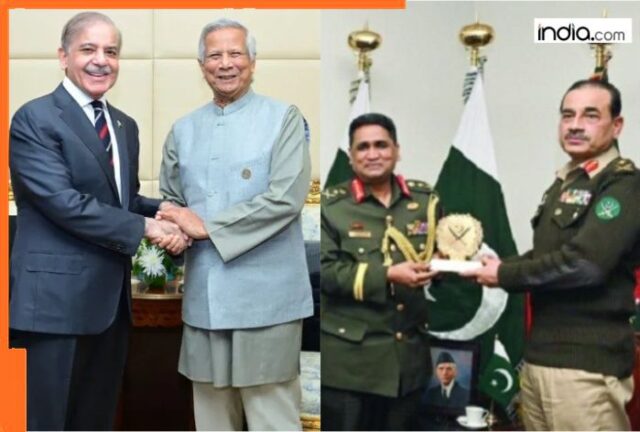The rapid policy shift in Bangladesh has stunned experts, who are shocked at how the two countries, once bitter enemies, have rapidly moved closer on several fronts, leading to a deterioration in India-Bangladesh relations.
India-Bangladesh relations: In a major development that will undoubtedly further deteriorate the already strained India-Bangladesh relations, Dhaka’s Muhammad Yunus-led interim government has thrown open its door for Pakistan, expanding trade as well as military cooperation with Islamabad.
The rapid policy shift in Bangladesh has stunned experts, who are shocked by how Bangladesh and Pakistan, once bitter enemies, have rapidly moved closer on several fronts, almost immediately after the fall of the Sheikh Hasina regime in August last year.
Top military officials from Pakistan and Bangladesh exchanged reciprocal visits to the each other’s respective countries within a span of less than a week, with a six-member Bangladeshi delegation led by Bangladesh Army’s principal staff officer (PSO) of Armed Forces Division, Lt General SM Kamrul Hassan, embarking on a 4-day visit to Pakistan from January 13-18, where they reportedly met Islamabad’s top military leadership in Rawalpindi, including Pakistan Army chief General Asim Munir.
Barely a week later, a delegation of senior officials of the Pakistan Army and Inter-Services Intelligence (ISI)– Islamabad’s infamous spy agency– arrived in Dhaka on a four-day visit on January 21. The four-member delegation, reportedly headed by ISI chief Lt Gen Muhammad Asim Malik, also includes Major General Alam Amir Awan, and Major General Shahid Amir Afsar– ISI’s chief of analysis who previously served as Pakistan’s defence attache in Beijing.
While its unconfirmed that ISI chief Lt Gen Asim Malik is indeed a part of the delegation, one of the officials reportedly shares a similar name to Pakistan’s spymaster-in-chief, triggering speculations about him heading the team to Dhaka.
Experts stunned
Notably, the first high-level visit between Pakistan and Bangladesh took place at the military level, not been political figures, a development which has surprised many analysts, who say that the Bangladesh Army has essentially ‘bowed down’ and “surrendered” before Pakistan.
Senior Pakistani journalist Najam Sethi sees the back-and-forth military-level visits between the two countries as a major policy shift in Bangladesh, which happened rather quickly than anticipated by experts, including himself.
“First spoil relations with India and then mend ties with Pakistan. There has been a very quick policy shift in Bangladesh, which many, including myself had not anticipated,” Sethi said on Pakistan news channel, Samaa TV.
The veteran journalist termed the manner in which Bangladesh has shunned India and embraced Pakistan as “surprising”, and described the growing military cooperation between Bangladesh and Pakistan as an achievement for Islamabad, and a setback for New Delhi. On Bangladesh seeking to acquire JF-17 Thunder fighter jets from Pakistan, Sethi noted that it was another worrying development for New Delhi, as it would significantly boost Bangladesh’s air power.
Meanwhile, former Pakistan High Commissioner to India, Abdul Basit, advised Islamabad to tread carefully and learn a lesson from the debacle in Afghanistan.
India-Bangladesh relations at all-time low
India-Bangladesh relations have hit an all-time low after the ouster of former Prime Minister Sheikh Hasina, and an interim government led by Nobel laureate Muhammad Yunus, coming to the helm in Dhaka.
Widespread communal violence against minorities in Bangladesh, especially Hindus, which has soured Dhaka’s ties with New Delhi, with the latter accusing the Yunus-led interim government of not doing enough, and turning a blind eye to the atrocities perpetrated by radical Islamist elements against the minority Hindu community in the country.
Notably, amid rising tensions in India-Bangladesh relations, Dhaka is reportedly preparing for a direct military confrontation with India, a recent intelligence report has revealed.
















































